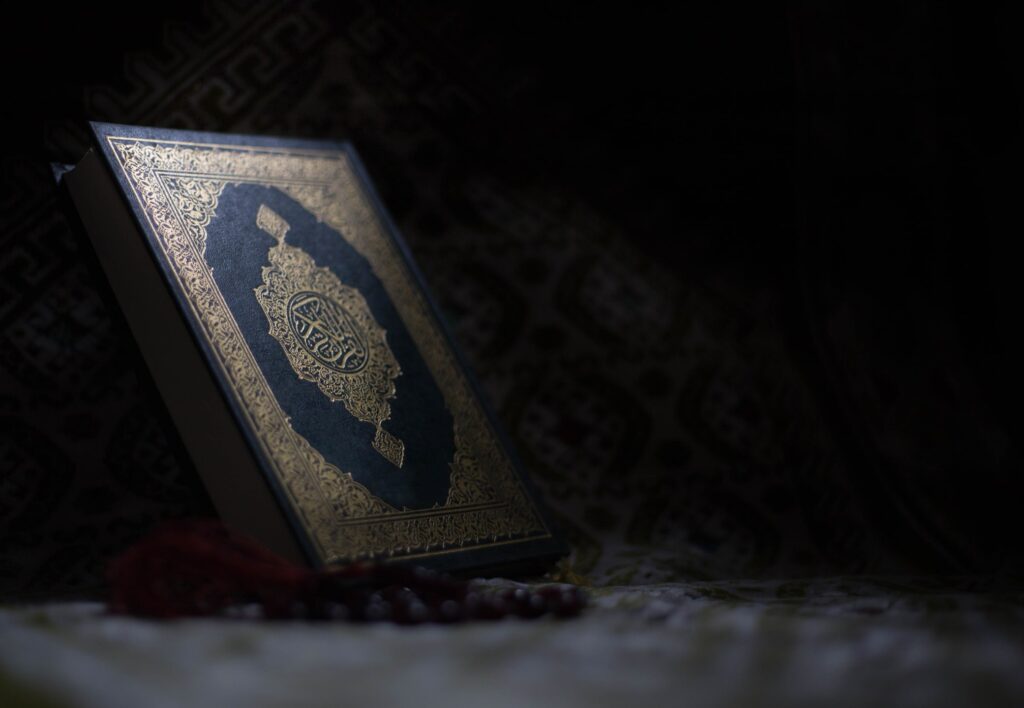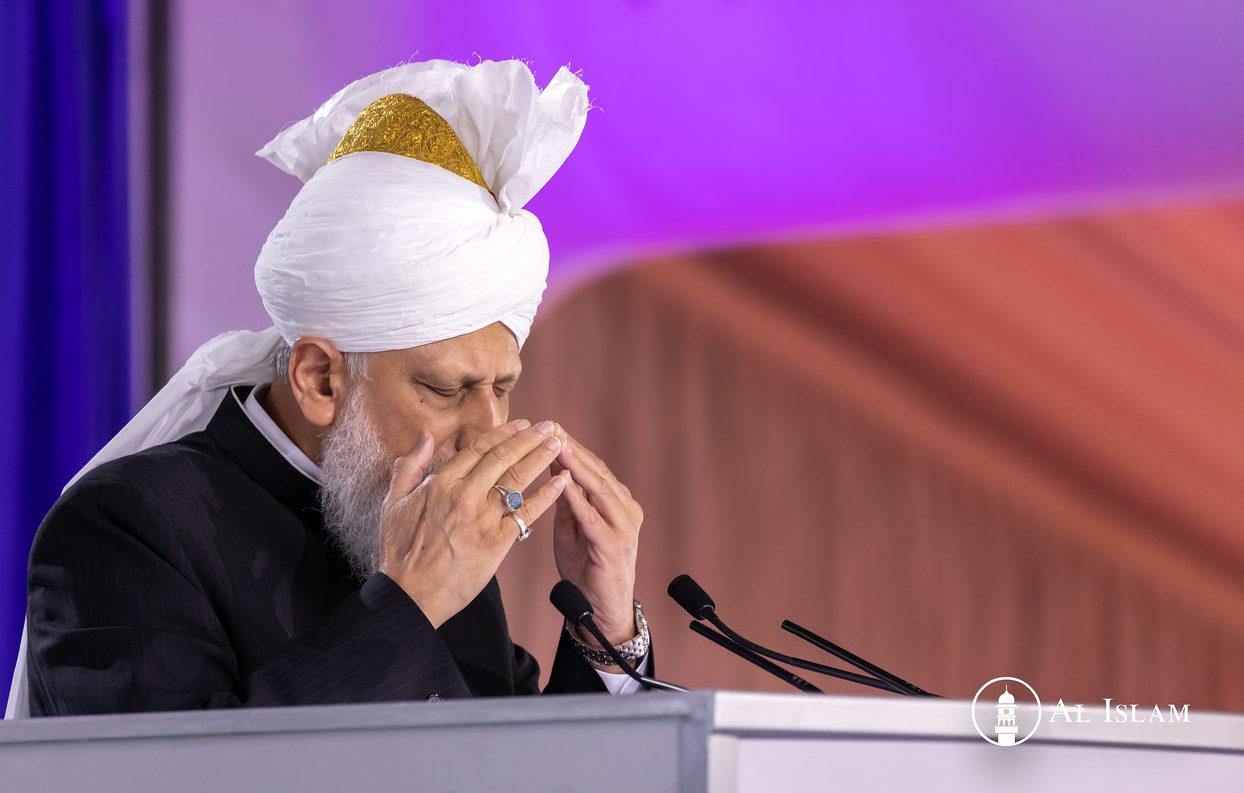The Holy Quran is a timeless book, no portion of which is subject to abrogation. It is a scripture designed to be relevant in all times and for all cultures.
In today’s age, Islam is subjected to heavy criticisms, and its teachings and commandments are highly misunderstood. It is evident that most of these criticisms stem from the misinterpretation of the Quranic text and hence, an accurate and true explanation of the scripture is called for. Hence, this series presents the authentic explanation of the Holy Quran provided by the leaders of the Ahmadiyya Muslim Community, which we believe will do a great deal in clearing the numerous misconceptions that have become associated with Islam.
In this issue, which is the second in the series, we present the explanation of Surah Baqarah verse 107 from Tafsir-e-Kabir (The Grand Exegesis) by Hazrat Mirza Bashiruddin Mahmud Ahmadra, the Second Caliph of the Ahmadiyya Muslim Community. This is an abridged translation of his commentary of the verse. Light of Islam team takes full responsibility for any error in this translation.
NOVEMBER 28, 2022
مَا نَنْسَخْ مِنْ آيَةٍ أَوْ نُنْسِهَا نَأْتِ بِخَيْرٍ مِنْهَا أَوْ مِثْلِهَا أَلَمْ تَعْلَمْ أَنَّ اللَّهَ عَلَى كُلِّ شَيْءٍ قَدِير
Whatever message We abrogate or cause to be forgotten, We bring one better than that or the like thereof. Knowest thou not know that Allah has the power to do all that He wills?
Holy Quran 2:107
Keyword Analysis
ننسخ Nansakh (we abrogate): Nansakh is the present and future tense of the verb nasakha. Nasakha ash-shai’a means ازاله وابطله و مسخه i.e. he annulled, superseded, abolished, or made void, a thing.
ننسھا Nunsihā (we cause to be forgotten): Nunsihā is the the present and future tense of the verb ansā. Ansā al-rajulu ash-shaia means حمله علی نسیانه i.e. he caused it to be forgotten. Hence, nunsihā means, we cause to be forgotten; we erase erase from memories.
آیة Āyat (message): Al-Āyat is ar-Risālat i.e. message.
Exegesis
Muslims, in general, have misunderstood this verse, so much so that if what they infer from the verse is deemed true, it would call to question the very truthfulness of Islam. Most Muslims understand this verse to mean whichever Quranic verses Allah abrogates or causes to be forgotten, He brings one better than that or the like thereof. On this basis, they try to assert the theory of abrogation in the Holy Quran and claim that some of its verses have been abrogated by others. Similarly, it is also believed that some verses of the Quran were erased from people’s memory.
Different types of abrogation falsely associated with the Quran
According to this theory, there are different forms of abrogation in the Holy Quran.
The first form of abrogation is that the text of a verse is omitted from the Holy Quran while its ruling remains valid. A verse is often cited in this regard which, they say, was a part of the Quran but was later removed.
The old man and old woman when they commit adultery, stone them without any ambiguity as an exemplary punishment from Allah. And Allah is Powerful, Wise.[1]
The second form of abrogation, according to them, is that the text of the verse remains while the ruling is annulled. The verse “there is no compulsion in religion”[2] is quoted as an example of this, which according to them, was abrogated by the verses of Jihad. They contend that it was now permissible to convert people to Islam by force.
The third form of abrogation is that both the text and ruling of a verse are expurgated. The example they cite for this is the change of the Qibla (the direction in which Muslims perform their prayers). Muslims were first commanded to offer their prayers in the direction of Bayt al-Maqdis, which is not permissible now. Hence, the verse is neither present in the Quran in its text, nor is its ruling valid now.
These are the three forms of abrogation falsely associated with the Holy Quran. As for the part “[We] cause [some portions] to be forgotten”, it is said that those verses were erased from people’s memory. An incident is often cited in this regard that two companions learnt a portion of the Quran from the Holy Prophetsa. One night, when they tried to recite that portion, they could not remember a word from it. They approached the Holy Prophetsa the next morning and related the issue to which the Holy Prophetsa replied that the chapter was among the abrogated verses and had been caused to be forgotten.[3]
The result of a lack of understanding
Human intellect varies from person to person. Matters that are comprehensible to one may not be accessible to another. Given this, if it is left to human reasoning to decide which of the Quranic verses are practicable and which are not, it will result in the invalidation of the entire Holy Quran. Because some people will fail to understand certain verses while others will be unable to perceive the meaning of certain other verses. This is the reason that the number of abrogated verses varies from five to 1100.
If a person reflects upon this point even superficially, he can easily understand that after accepting the theory of abrogation, the reliability of the Holy Quran becomes null and void.
Similarly, the part “[We] cause [some portions] to be forgotten” is also interpreted erroneously. They claim that it relates to the verses of the Holy Quran. However, such an understanding is in stark contradiction with the following verse that specifically occurred regarding the Quran.
We shall teach thee the Quran, and thou shalt forget it not.”[4]
That is to say, for the theory of abrogation to be true, the latter verse should have been abrogated. But Allah’s schemes are so wondrous that none of those who assert abrogation in the Quran has ever counted “thou shalt forget it not” among the abrogated verses.
Likewise, Allah says:
Verily, We Ourself have sent down this Exhortation, and most surely We will be its Guardian.[5]
Here it has been clearly stated that God has Himself undertaken the responsibility of protecting the Holy Quran. It would be meaningless to say about a book which has been granted the promise of Divine protection that its verses may be abrogated or forgotten.
The truth is that no portion of the Holy Quran is subject to abrogation. Every single one of its words is practicable until the day of judgement. Those who assert the theory of abrogation in the Quran fail to present evidence in this regard. They do not provide any proof that the Holy Prophetsa had declared such and such verses to be abrogated. When they find a verse to contradict another owing to their lack of understanding, they infer that one of the two must have been abrogated by the other. In this way, they declare all such verses to be abrogated whose meaning they fail to perceive.
There is absolutely no contradiction in the Holy Quran, to evade which, one should take recourse to the erroneous theory of abrogation. I challenge any discerning critic or opponent to come forward and prove any contradiction in the Holy Quran which they will never be able to do.
The context of the verse defies the theory of abrogation
While most exegetes interpret this verse to be speaking of the abrogation of Quranic verses, such an inference stands antithetical to its very context.
The fact is that the subject matter addressed in the verse is not about Quranic verses at all. Rather, the preceding verses make a reference to the book of Jews who claim to be the recipients of God’s favours and say that they will only believe in the scriptures of their prophets. In this sense, the abrogation mentioned here is the abrogation of previous scriptures and not the Holy Quran. Otherwise, it would be an inane argument on the part of God to state that the Holy Quran is also subject to abrogation and will be forgotten, for which they should believe in it.
The true purport of the verse should be in accordance with the context. Any interpretation that contradicts the spirit of the preceding verses cannot be deemed true.
The true interpretation
It is clear from the context that the preceding verses speak of Jews regarding whom it is stated that they do not desire any good to be sent down to Muslims while Allah sends down His favours to whomsoever He pleases. The greatest blessing of God being Divine revelation, Allah bestowed His favour upon Muslims in the form of the Holy Quran.
Since an objection could have been raised regarding the need for a new scripture in the presence of old books, the answer to it is discussed here. The verse under comment points out that after a certain period, Divine scriptures either become impractical or people forget their teachings. This means, certain portions of those scriptures become outdated owing to the changing conditions of the world and become worthy of abrogation. Likewise, certain other portions are forgotten by people as they abandon them and stop practising upon them. Such teachings, since they do not require abrogation, stand in need to be resuscitated.
Hence, the words “We bring one better than that” occurred with reference to the teachings which required abrogation while the words “the like thereof” relate to those teachings which were forgotten by people and needed to be re-introduced. Thus, Allah abrogated some teachings of old scriptures and brought in their place better ones in the Holy Quran. Similarly, He resuscitated those portions which were forgotten by people and re-introduced them in this Book.
This is the true interpretation of the verse which is consistent with the context and the general spirit of Quranic teaching.
The Quran’s message is eternal and universal
Another objection can be raised here that needs to be resolved. While it is stated that Allah replaces an old law with a new law when the former becomes obsolete, does this not indicate that the Quran will also become abrogated at some point? It should be remembered in this regard that Allah has made the following unambiguous statement about the Holy Quran:
Verily, We Ourself have sent down this Exhortation, and most surely We will be its Guardian.
When a law is offered Divine protection, it means that it will always excel other teachings. It is only when a book becomes worthy of abrogation that it is superseded by a better one as it is stated, “Whatever message We abrogate or cause to be forgotten, We bring one better than that or the like thereof”.
In other words, when a law is not abrogated, it implies that there is no law better than that. This clearly means that the Holy Quran not only surpasses the previous scriptures but is a book that will always remain the most superior of all scriptures. Abrogation of such a law is out of the question.
REFERENCES
[1] Musnad Ahmad bin Hanbal, Musnad al-Ansar
[2] Holy Quran 2:257
[3] Mentioned by Ubaid in An-Nasikh wal-Mansookh, and by Tahawi in Mushkil al-Athar
[4] Holy Quran 87:7
[5] Holy Quran 15:10












1 Comment
Naeem Ahmad.M · November 28, 2022 at 12:33 pm
Explanation of Holy Quran (The Grand Exegesis) of The Second Caliph of the Ahmadiyya Muslim Community ia really an excellent one,ever seen in any other Transactions. All praise belongs to Almighty God.